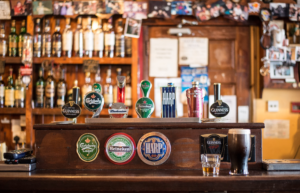Creating the Perfect Pub Business Plan

Turning your dream of opening a pub into a successful reality requires careful planning and execution. A pub business plan should be engaging and persuasive, convincing potential investors and stakeholders that your pub is a worthwhile venture.
A solid business plan is the foundation of a pub’s success – much as it is for restaurants – guiding you through each stage of the process and helping you navigate the inevitable challenges. Here is our guide to creating the perfect pub business plan.
Detail your Niche and Target Audience
Describing your business and detailing a target audience is crucial in defining the identity and appeal of your pub.
Begin by clearly outlining the type of pub you envision, whether it’s a cosy traditional pub with a focus on local craft beers and hearty comfort food, a trendy gastro pub offering innovative cuisine paired with artisanal cocktails, or a lively sports bar catering to fans with big screens and game-day specials.
The theme and décor should reflect your pub’s concept and resonate with your target audience. For example, if you’re aiming for a rustic charm, consider using reclaimed wood and vintage signage. Alternatively, a modern gastro pub might feature sleek furniture and minimalist design elements.
Services and amenities play a significant role in enhancing customer experience. Beyond beverages and food, consider offering live music nights, themed events, or even a cosy outdoor patio. These extras can set your pub apart and attract a loyal customer base. Each decision should support your vision for the pub and its place within the local market.
Conduct a Market Overview
Conducting a comprehensive market overview is essential for establishing your pub’s competitive edge and ensuring its sustainability in the industry, thus driving its profitability.
Identify your target market through detailed demographics and psychographics. Understand who your potential customers are—age, income level, lifestyle preferences, and interests—and how your pub can appeal to their tastes and preferences. This knowledge will guide your marketing efforts and menu development.
A thorough competitive analysis is critical to identifying both the strengths and weaknesses of local competitors. Evaluate their offerings, pricing strategies, customer service standards, and market positioning. Highlight areas where your pub can differentiate itself, whether through a unique menu concept, exceptional customer service, or a distinctive atmosphere.
Whether it’s providing a welcoming community hub for locals, offering a diverse menu that caters to various dietary preferences, or aligning with current trends, you should demonstrate a clear strategy for attracting and retaining customers based on identified market demands.
We can help identify market needs by clearly outlining how your pub will fulfil them. At The Engine Room, we can offer insight into, and analysis of, the target market, specific to your area and with our expensive experience in hospitality.
Create a Budget and Financial Statement
The financial plan is one of the most vital sections of your pub’s business plan. It outlines your budget, projected income and expenses, providing a clear picture of your pub’s financial viability. This section should include detailed financial statements and predictions, helping potential investors understand the return on their investment.
Start by outlining the startup costs involved, including expenses for renovations to create the desired ambiance, purchasing equipment necessary for food and beverage preparation, and acquiring necessary licences and permits to operate legally.
Calculate the cost of goods sold meticulously, accounting for the expenses incurred in producing each menu item or beverage, including ingredients, packaging, and labour costs. You should also accommodate for operating expenses, which encompasses ongoing costs like rent for your pub space, utilities, wages for staff, insurance premiums, marketing, and maintenance costs. Including a detailed cash flow statement is essential for monitoring the inflow and outflow of cash within your business, ensuring you have adequate funds to cover expenses and investments.
Revenue projections are a significant component, offering insights into your expected income based on both monthly and annual sales forecasts. These projections should consider factors such as peak seasons, local economic trends, and customer spending habits.
Lastly, conduct a break-even analysis to determine the point at which your pub will start generating profit, factoring in fixed and variable costs against projected sales volumes. By meticulously detailing these financial elements in your business plan, you not only provide potential investors with a clear understanding of the financial health of your pub but also establish a roadmap for managing finances effectively.

Marketing and Sales Strategy
Your marketing and sales strategy outlines how you plan to attract customers to your pub and keep them coming back. This includes your branding, pricing, promotional activities, and sales tactics.
Your pub’s branding should reflect its unique personality and ambiance. This involves creating a distinct logo, colour scheme, and overall aesthetic that resonates with your target audience. Positioning involves identifying what sets your pub apart from competitors and consistently communicating this through all marketing efforts.
Leveraging various marketing channels is vital. 88% of people are influenced by reviews and online comments, therefore utilising social media platforms like Instagram and Facebook to engage with potential customers and having an intentional digital strategy is very important to your restaurant or bar. Entice customers through creating visually appealing content and interactive posts. Localised advertising, such as flyers and community bulletin boards, on the other hand can increase visibility within the neighbourhood.
Effective sales tactics include upselling higher-margin items and ensuring staff are well-trained. Personalised interactions and attentive service can significantly impact customer satisfaction and loyalty.
Pricing must align with the perceived value of your offerings and the spending habits of your target demographic. Competitive pricing, combined with strategic promotions and discounts, can attract new patrons while retaining existing ones.
How the Engine Room Can Help Your Restaurant Business
By effectively analysing these key elements, you can position your pub strategically within the market and maximise its potential for success.
The perfect pub business plan should be clear and concise so try to avoid jargon and keep your language straightforward. Wherever possible, back up your statements with data and research as this adds credibility to your plan. Overall, it’s important to be optimistic but you must remember that your projections should be based on realistic assumptions.
Creating the perfect pub business plan takes time and effort, but it’s an integral step in turning your vision into a successful reality. If you would like help drafting a cohesive pub business plan get in touch with our team at enquiries@the-engineroom.co.uk or 020 3322 1760. The Engine Room works as an extension of your business, as expert pub consultants we help you to handle the financial and operational sides of your business so that you can work on managing the day-to-day.


